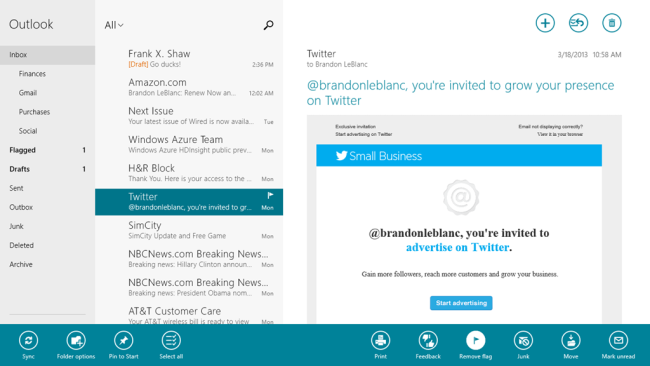Microsoft has promised richer features for Windows 8 tablet users and has begun by introducing new updates to its Windows 8 Mail, Calendar and People applications. The software giant has also launched a new version of its Xbox Music app, making it more usable across the cloud and on devices like the Surface RT.
The new updates are available immediately from the Windows Store.
Mail has been updated to include flagging, junk mail and folder support. Calendar has been given a new weekly view and an inline time view.
Improvements have been made for composing email messages, too. You can now add, edit, and delete hyperlinks and edit bulleted or numbered lists more easily in email messages.
New search and print features have also been added to the Mail app that launch the Charms side bar.
The People social connections app boasts a new user interface and the ability to post to friends’ Facebook walls.
“The features that are part of this update for the Mail, Calendar, and People apps are designed to align with the different habits people have for staying on top of their email and schedule and staying organised,” said Brandon LeBlanc, communications manager at Microsoft.
“These updates are part of our ongoing focus and commitment to continually improving your Windows experience. This means that the experience on Windows PCs and tablets will keep getting richer,” LeBlanc promised.

Casualties of war
However, one of least popular changes is the removal of Google’s Exchange ActiveSync support for Mail, Calendar and Contacts, which follows Google’s plans to stop supporting the ActiveSync protocol.
If you remember the ongoing spat between Microsoft and Motorola (now Google) over patents concerning the wireless features in the Xbox and its accessories, one of the results of the fallout was the removal of ActiveSync from Motorola smartphone devices and now this is spreading across the entire ecosystem. A walled garden seems to be emerging between Microsoft’s Mail and Google’s Gmail ecosystems.
In terms of the new Xbox Music version, Microsoft has simplified control over the music users store in the cloud.
A new volume control has been added and a preferences panel lets users select songs from their collections and replicate them across other devices using the Xbox music app.